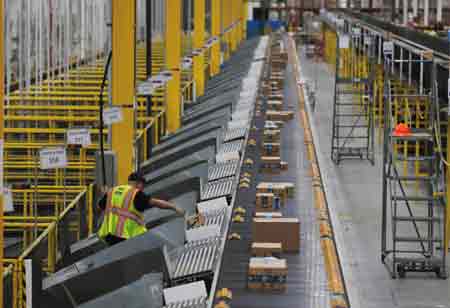THANK YOU FOR SUBSCRIBING
FarEye Collects $25M Investment from M12 led Series D Round of Financing
FarEye, a logistics company that works on a SaaS-based platform powered by ML algorithms, raised $25M in its Series D round of Funding led by M12

By
Apac CIOOutlook | Thursday, April 30, 2020
Stay ahead of the industry with exclusive feature stories on the top companies, expert insights and the latest news delivered straight to your inbox. Subscribe today.
FarEye, a logistics company that works on a SaaS-based platform powered by ML algorithms, raised $25M in its Series D round of Funding led by M12
Fremont, CA: FarEye, a SaaS-based logistics startup, has closed its Series D round of financing after securing $25 million. The round was led by M12 venture partners with the participation from Eight Roads Venture and Honeywell ventures. Some of the existing investors, such as SAIF Partners, also participated in the funding round.
“We will use this investment to create greater value and improve the experience for our customers by enhancing the platform’s predictive capabilities, increasing platform partnerships, expanding into new markets and growing our teams in Europe, APAC, and the US,” said Kushal Nahata, CEO of FarEye.
“From just-in-time logistics optimization to last-mile transportation notifications for end customers, supply chain visibility is a business imperative for organizations,” said Abhi Kumar, M12 India Head.
The company, since its inception in 2013 by the Gautam Kumar, Gaurav Srivastava, and Kushal Nahata, FarEye predictive logistics platform, enables enterprises to orchestrate, track, and optimize their logistics operations.
“FarEye stands out amongst other supply chain solutions for its orchestration and predictive intelligence capabilities, which equip enterprise customers to respond quickly and strategically in dynamic business environments,” Abhi added.
FarEye’s Java-based, Microsoft Azure-backed Server platform enables the company’s clientele, such as Domino’s, Walmart, Amway, 7-Eleven, and DHL, to innovate and track logistics operations with automated dispatch and order allocation, electronic proof of delivery, customer-facing apps, and other such tools. Delays and Handles exceptions are anticipated and, at the same time, optimizing delivery routes to reduce miles per shipment and boost fleet productivity, taking into account factors like traffic, weather, and detours. ML algorithms use data from the past pickup and delivery attempts to upgrade future estimates, and over a billion customers’ addresses are geo-coded to boost success in first-attempt delivery rates.





